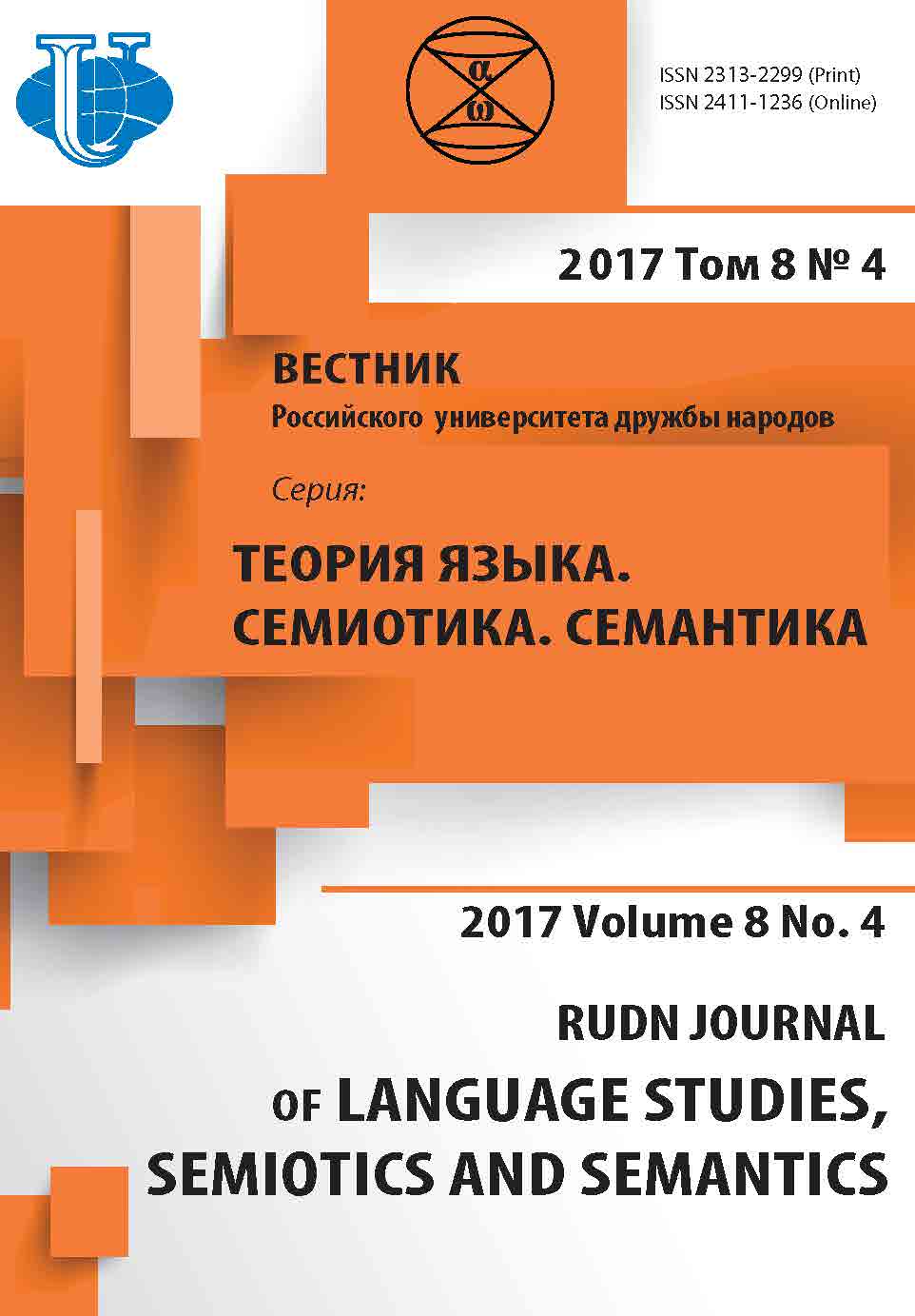CREATIVE TYPES OF SPEECH ADVERTISING SLOGAN AS A TEXT “WITH A CREATIVE TASK”
- Authors: Mikheeva E.S1
-
Affiliations:
- RUDN University
- Issue: Vol 8, No 4 (2017)
- Pages: 847-853
- Section: ARTICLES
- URL: https://journals.rudn.ru/semiotics-semantics/article/view/17962
- DOI: https://doi.org/10.22363/2313-2299-2017-8-4-847-853
- ID: 17962
Cite item
Full Text
Abstract
The urgency of the work is due to the fact that modern speech activity has a distinct creative character. The research of the creative potential itself in the linguistic system, on the one hand, and linguistic identity (the speaker), on the other, is one of actual directions of modern linguistics. The different definitions of types of speech cannot give a full description of the variety of types of modern Russian speech. One of the steps towards a modern perspective on this issue is the selection and description of creative styles of speech that have a differential feature as the creative transformation of language units into the facts of speech. The appeal to the sphere of creative types of speech allows to understand a new perspective on the main language features. So in modern linguistics is being formed the representation of creative function, therefore there is a need of analysis of this feature in the aspect of its interaction with aesthetic function and linguistic manipulation. Analysis of the implementation of these functions in creative types of speech allows to identify texts with an imaginative task (with imagery in a broad sense), where the realization of the aesthetic function is a necessary condition, and the texts with a creative task, characterized by the realization of creative functions, as well as linguistic manipulation. Despite the fact that some advertising slogans can be combined with several imaginative means to talk about their aesthetic values, ad-vertising slogans should be attributed to the texts with a creative task.
About the authors
Elena S Mikheeva
RUDN University
Author for correspondence.
Email: mikheeva_ys@mail.ru
Mikheeva Elena Sergeevna, PhD, Lecturer of General and Russian Linguistics Department of Peoples’ Friendship University of Russia; Scientific Interests: theoretical grammar, linguistic stylistics of modern Russian language, media linguistics
Mikhlukho-Maklaya str., 10/2A, Moscow, Russia, 117198References
- Vinogradov, V.V. (1976). Selected works. The poetics of Russian literature. Moscow: Publishing House “Nauka”. (in Russ.).
- Gridina, T.A. (2002). Language game as linguistic and creative activities. Language. System. Personality. Language game as a kind of linguistic and creative activities. Formation of the languag e personality in ont ogenesis: the materials of reports of all-Russian scientific conference, 25—26 April 2002. Ekaterinburg, 25—31. (in Russ.).
- Krylova, O.A. (2013). Imagery and texts with creative task. Scientific reports of higher school. Philological science, 3, 21—25. (in Russ.).
- Krylova O.A. & Remchukova E.N. (2002). Hyperexpression and combinat orics of grammatical me dium. Abstracts of reports and speeches International scientific-methodical conferen ce “ Modern Russian language: formation and problems of teaching” March 22—23, 2002. Budapest, 33—34. (in Russ.).
- Linguistics creativity-2: Collective monograph (2012). under the General editorship of Professor T.A. Gridina. 2-e Izd. Ekaterinburg: the Ural StateUniversity. (in Russ.).
- Novikov, L.A. (2001). Selected works. Vol. 1. The problem of the language difference. Moscow: Peoples’ Friendship University of Russia. (in Russ.).
- Remchukova, E.N. (2005). Creative potential of Russian grammar. Moscow: Peoples’ Friendship University of Russia. (in Russ.).
- Remchukova, E.N. (2009). Linguistic and creative components of the modern media on the background of the active language processes. Humaniora: Lingua Russica. Works on Russ ian and S lavic Philology. Linguistics XII. Active processes in Russian language Diaspora and the metropolis. Tartu. pp. 303—316. (in Russ.).
- Strakhova, A.V. (2012). Verbal and non-Verbal means of expression of gender oriented advertising text in Russia and in France [dissertation] Peoples’ Friendship University of Russia. Moscow. (in Ru ss.).
- Trick, H.E. (1981). The Main directions of the experimental study of creativity. Anthology of General psychology. Psychology of thinking. Moscow: Moscow State University. (in Ru ss.).
- Mode of access: http://studbooks.net/891721/marketing/paragraf_mehanizm _raboty_slogana Date of access 01.09.2017.
Supplementary files












